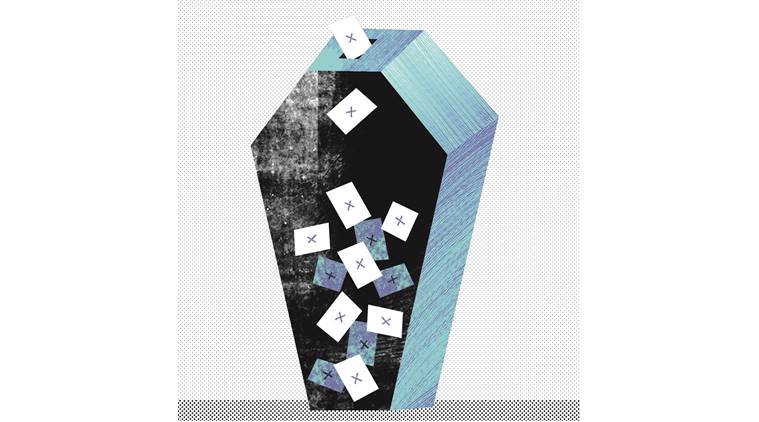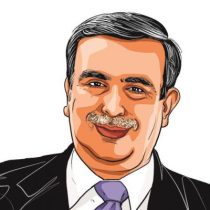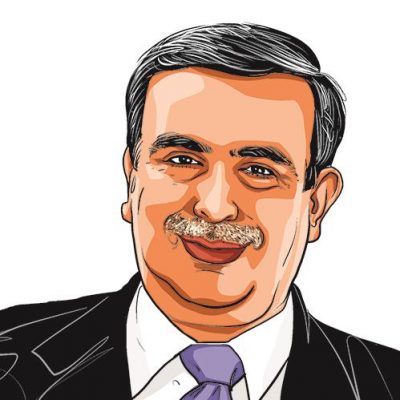A history of undemocracy
The fall of the Mehbooba Mufti government is only the latest instance. New Delhi’s policy towards Jammu and Kashmir has been to prefer rule by bureaucracy and fiat rather than by elected state governments

The chaos, noise, and messiness of democracy are always an option to be preferred over bureaucratic rule. (Illustration by C R Sasikumar)
Almost every introductory course on contemporary Indian politics begins with a fundamental question: Why did democracy survive and succeed in India (except for the 19 dark months of the Emergency) when it failed in much of the post-colonial world — including in India’s neighbourhood? And every sharp tutor provides a variety of explanations, without privileging any one: The ideals of the freedom movement; the accident of a visionary leadership deeply committed to democracy; the checks and balances provided by an elaborate Constitution; and the “argumentative” gene which has defined India and Indians. A similar question (turned on its head) has often been articulated and is voluble in the social media, and on the streets of Srinagar of late. Why doesn’t New Delhi trust the people of the state with real democracy? And why has the erosion of democratic institutions been one consistent factor in New Delhi’s Kashmir policy? Mehbooba Mufti is only the latest victim of a policy that goes back to inarguably contemporary Kashmir’s strongest leader, Sheikh Mohammad Abdullah.
In August 1953, the Sheikh was holidaying in Gulmarg when, early in the morning, the Superintendent of Police, Lakshman Das Thakur, informed the Prime Minister of J&K (as was the nomenclature then) that he had been dismissed and was being interned. “Who ordered this?” The Sheikh is believed to have roared, believing that his friend in Teen Murti House, Prime Minister Jawaharlal Nehru, would never betray him. Thakur presented an order, signed by the Sadar-i-Riyasat, Karan Singh, barely out of his teens, whose father, Maharaja Hari Singh had been exiled to Mumbai. The Sheikh took time to offer namaz before accepting that the “chit of a boy” he had appointed had just removed him from office “undemocratically”. For 22 years, the Sheikh stayed out of power, arguably the most popular leader, until he accepted an accord with Indira Gandhi in 1975.
Of course, the contagion of not allowing democracy in J&K had infected Sheikh’s National Conference as well, as he barely allowed any opposition to survive in the state. And made the most inflammatory speeches in RS Pura, flirted with American emissaries and let the tallest leader of the Jana Sangh, Syama Prasad Mukherjee die in Srinagar on his watch in mysterious circumstances.
His successor, Bakshi Ghulam Mohammad, with Delhi’s patronage, manipulated elections to the point that Nehru had once to counsel him to allow at least some opposition to grow, even if for purely cosmetic reasons.
Post-Sheikh, his son and political successor, Farooq Abdullah, was the recipient of New Delhi’s blessings as well as the lack of faith in Indian democracy. In 1984, Abdul Ghani Lone — father of the PC leader Sajjad Lone — had to wake up Abdullah from his slumber to inform him that a large section of his loyal MLAs had defected and were in Raj Bhawan with Governor Jagmohan. Farooq was dismissed and BK Nehru, the former governor, reveals that the defection was arranged after large sums of money were moved by conduits of the IB, including one well-known Congress leader/businessman. and paid to the defecting MLAs.
Post-Sheikh, his son and political successor, Farooq Abdullah, was the recipient of New Delhi’s blessings as well as the lack of faith in Indian democracy. In 1984, Abdul Ghani Lone — father of the PC leader Sajjad Lone — had to wake up Abdullah from his slumber to inform him that a large section of his loyal MLAs had defected and were in Raj Bhawan with Governor Jagmohan. Farooq was dismissed and BK Nehru, the former governor, reveals that the defection was arranged after large sums of money were moved by conduits of the IB, including one well-known Congress leader/businessman. and paid to the defecting MLAs.
In 1987, Kashmir’s rigged assembly election, fought by the National Conference and Congress together, we now know without a shred of doubt, would lead to the decades of the militancy. My father, a respectable Kashmiri Pandit, found that his vote had already been cast in the Amira Kadal constituency where Maulvi Yusuf Shah from the Muslim United Front (now Syed Salahuddin of the Hizbul Mujahideen) was contesting against the National Conference’s Ghulam Mohiuddin Shah.
There have been exceptions: The 1977 elections that once again announced the Sheikh’s popularity; the 2002 elections where Prime Minister Atal Bihari Vajpayeemade sure that fair elections lead to a coalition government, led by the Opposition Congress and the People’s Democratic Party, initially under the chief ministership of Mufti Mohammad Sayeed and the 2014 elections that brought the ill-fated PDP-BJP coalition together.
But these have been exceptions. In essence, if not in form, a patron-client relationship rather than strengthening real democracy is the mainstay of New Delhi’s policies. Consider this, with the flourish of some atmospherics.
On this Tuesday, June 19, afternoon, the civil secretariat in Srinagar was unusually quiet. The Stalinist-style multi-storey building houses the offices of most of the senior bureaucracy and, of course, the hallowed third floor houses the chambers of the chief minister and the chief secretary. There are usually queues of ordinary citizens waiting to be frisked and then gain access to the corridors of power. The celebrations of Eid-ul-Fitr, over the weekend (after a month of fasting during Ramzan), usually carry on into the working week, but there was something ominous, an unquiet calm. The chief minister had a thin agenda for the day, only a substantive meeting with legislatures of reserved categories.
On this Tuesday, June 19, afternoon, the civil secretariat in Srinagar was unusually quiet. The Stalinist-style multi-storey building houses the offices of most of the senior bureaucracy and, of course, the hallowed third floor houses the chambers of the chief minister and the chief secretary. There are usually queues of ordinary citizens waiting to be frisked and then gain access to the corridors of power. The celebrations of Eid-ul-Fitr, over the weekend (after a month of fasting during Ramzan), usually carry on into the working week, but there was something ominous, an unquiet calm. The chief minister had a thin agenda for the day, only a substantive meeting with legislatures of reserved categories.
Soon after the meeting, the chief secretary, B B Vyas, received a phone call from Governor N N Vohra. Vohra communicated that he had received a fax from the BJP legislators, withdrawing support to the government. The chief minister had only two options: To resign or to ask for time to explore options for securing support. A proud Kashmiri, the daughter of Mufti Mohammad Sayeed took 15 seconds to verbalise her thoughts: “I am sending in my resignation”. No leader of the BJP, no Union minister or high functionary of the government had spoken to the CM. A week earlier, Union Home Minister Rajnath Singh had visited Srinagar and applauded the CM in an event that brought out thousands of young men and women of Kashmir.
Procedurally, perhaps correct, but bad in spirit and substance, New Delhi has faulted once again in Kashmir. The chaos, noise, and messiness of democracy are always an option to be preferred over bureaucratic rule. Was this done without the consent of Prime Minister Narendra Modi?
Mattoo was a cabinet-level advisor to Mufti Mohammad Sayeed. He is the author of a forthcoming book on contemporary Kashmir to be published by Penguin/Randomhouse.
For all the latest Opinion News, download Indian Express App
More From Amitabh Mattoo
- A vision for reconciliationA reminder on his first death anniversary: Mufti Sayeed’s politics celebrated democracy, diversity..
- Masked men of KishtwarThe anger of a lost generation threatens the idea of J&K..
- Inside the terror lab<B>THE AL QAEDA CONNECTION: The Taliban and Terror in Pakistan’s tribal areas</B> <B><font color="#cc000">Imtiaz Gul</font></B> Viking,Pages: 308,<B>Rs 499</B>..








































No hay comentarios:
Publicar un comentario